
Updated on: December 6, 2024
Short on time? Here’s 2025’s best risk-free VPN:
- 🥇 ExpressVPN : It doesn’t have a free plan, but you’re not going to find a better VPN on the market in 2025. Plus, it has a 30-day money-back guarantee, which means you can test it out for a whole month risk-free. ExpressVPN comes with industry-leading security features, super-fast speeds, cool extras like split-tunneling and an ad blocker, and excellent streaming and torrenting support.
I’m not a big fan of free VPNs, as most have serious drawbacks. At worst, a free VPN is dangerous, containing malware or selling your personal info. At best, a free VPN is too limiting, imposing low data caps, restricting access to important features, or capping speeds.
But if you only want a free VPN, I found the best ones. I tested big-name and lesser-known VPNs, and the ones I picked are secure and don’t monitor or store your browsing data. They also offer great speeds for all online activities, provide a few “extra” features, and are user-friendly.
I still recommend that you consider getting a premium VPN. The best VPNs (like my top choice, ExpressVPN) provide a ton of perks, including advanced security features, unlimited data, multiple connections, streaming support, and much more, all for just a few bucks a month. Editors' Note: ExpressVPN and this site are in the same ownership group.
TRY EXPRESSVPN (30 DAYS RISK-FREE)
Quick Summary of the Best Free VPNs in 2025
🥇1. ExpressVPN — Best Overall VPN in 2025
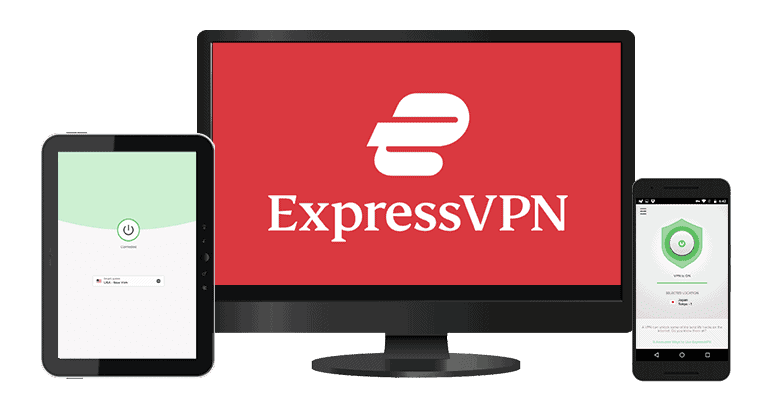
ExpressVPN isn’t free, but it’s the best VPN on the market and covers each purchase with a 30-day money-back guarantee — so you can test it out and still receive a full refund if you’re not happy with it.
However, it shouldn’t take you that long to realize why ExpressVPN sits at the top of the industry:
- It includes the best security features,
- It’s the best VPN for streaming, torrenting, and gaming,
- It maintains the fastest speeds,
- It offers easy-to-use apps for just about every online device.

When it comes to security and privacy, ExpressVPN has an audited no-logs policy (unlike some of the free VPNs on this list), an excellent ad, tracker, and malicious site blocker (most free VPNs either don’t have this feature or restrict access to it), and even a secure password manager that’s included for free with each subscription (out of the free VPNs on my list, only ProtonVPN gives you access to a password manager).
If you enjoy streaming movies and TV shows, you’ll love ExpressVPN. It works with every single popular streaming app, including Netflix, Amazon Prime, Disney+, and Apple TV+, as well as 100+ other streaming services. The only free VPNs on this list that support streaming are Windscribe and TunnelBear, but both of them have monthly data limits — so you can’t binge an unlimited number of shows and movies.
In my speed tests, ExpressVPN had impressive results, especially via its proprietary Lightway protocol: websites always loaded right away, videos started immediately, I was able to download a 20 GB file in only about 13 minutes, and there was zero lag while gaming. Most of the free VPNs I recommend have fast speeds on nearby servers, but all of them (except TunnelBear) give you access to only a handful of servers, so unless one of those is near you, your speeds will be much slower.

ExpressVPN is also excellent for torrenting, allowing P2P sharing across all servers (top free VPNs like ProtonVPN don’t allow torrenting), and it comes with a native router app, so all the devices connected to your router will be protected. Unlike Proton VPN, Hotspot Shield, and hide.me, which all allow only 1 connection on the free plans, ExpressVPN supports 8 simultaneous connections.
ExpressVPN offers monthly and yearly plans, and with our special 61% discount, you can get it for as low as $4.99 / month (and there’s usually a deal for additional months for free). And remember, ExpressVPN backs all plans with a 30-day money-back guarantee.
Bottom line:
ExpressVPN offers the best value out of all of the VPNs on the market in 2025. You’re not going to find a more secure or faster VPN out there. Also, it works with tons of streaming sites, allows torrenting, and has user-friendly features and apps. Although there’s no free plan, it has a 30-day money-back guarantee for all purchases.
Read the full ExpressVPN review here
🥈2. Proton VPN — Great Free Plan With Unlimited Data + Very Fast
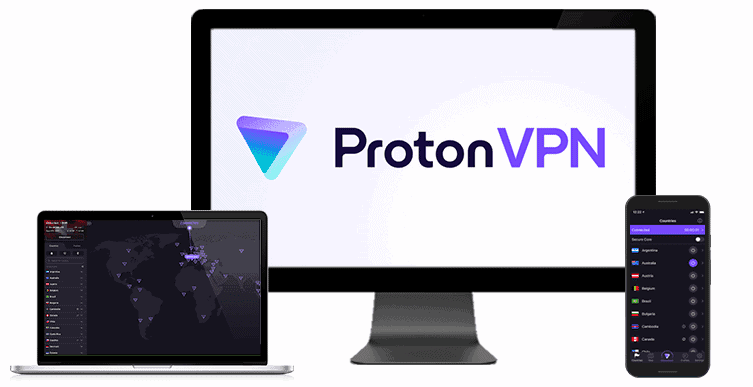
Proton VPN’s free plan comes with unlimited data and pretty good speeds — and it’s ad-free! This is pretty impressive because most VPNs have data caps or limit bandwidth usage for their free users — Windscribe and TunnelBear have a monthly data limit on their free plans, and Hotspot Shield forces you to watch an annoying ad every 15 minutes.
When it comes to speeds — in my tests, websites generally loaded right away, HD videos took 1-2 seconds, and 4K videos started within 3-4 seconds, and there was only minor buffering at the start of the videos. Proton VPN also has a speed-boosting feature called VPN Accelerator, but you can only access it via the paid version.
I really like that Proton VPN’s apps are all open-source, which means anyone can inspect the source code for any holes in security and privacy. And its no-logs policy has passed an independent security audit.

The provider’s free plan also includes access to servers in 5 countries — the US, the Netherlands, Japan, Romania, and Poland. The only downside is you don’t get to choose the server location. Instead, Proton VPN automatically connects you to the fastest server (and if it’s a distant one, then your speeds may be impacted as a result).
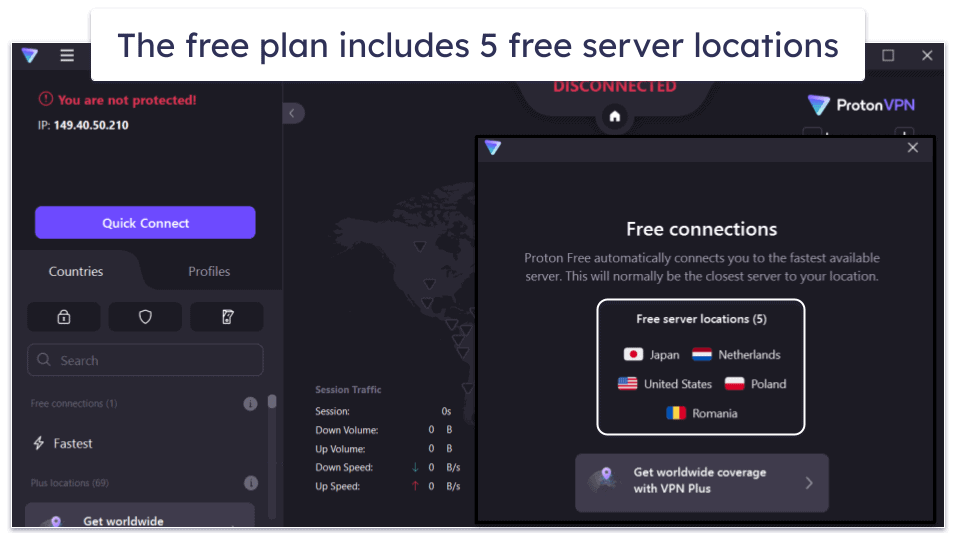
Proton VPN offers additional free servers in censorship-heavy countries 2 weeks before the elections and 1 week after. This initiative makes sure citizens have unrestricted access to important information and can securely communicate during these periods. Here’s a breakdown of where and when Proton VPN boosts its free server availability:
But the provider’s free plan has some drawbacks. It doesn’t support torrenting and it limits you to 1 device (though you can bypass this at least in your home by installing the VPN on your router).
While Proton VPN claims the free plan lacks streaming support, I was able to watch content on streaming services, but not consistently — for example, Netflix and Amazon Prime worked about half of the time. It also doesn’t include its ad blocker (NetShield), split-tunneling, port forwarding, Secure Core servers, which route your traffic through 2 servers instead of 1, or access to live chat.
Upgrading to the paid version (called Plus) adds more perks, such as servers in 91 countries, support for 30+ streaming services, P2P servers in 70+ countries, and 10 connections. That said, ExpressVPN provides much better value overall, as it has a larger server network, works with more streaming services, and has better P2P support. Proton VPN’s paid plans start at $3.59 / month, and the provider has a prorated 30-day money-back guarantee.
Bottom Line:
Proton VPN has one of the only free plans that allows unlimited data. It also provides access to servers in 5 countries (the US, the Netherlands, Japan, Romania, and Poland), strong security and privacy features, and pretty fast speeds for a free VPN. The paid version adds more servers, streaming and P2P support, and extras like an ad blocker and split-tunneling. Its paid plans are affordable and backed by a prorated 30-day money-back guarantee.
Read the full Proton VPN review here
🥉 3. hide.me — Great Free VPN With Many Free Server Locations
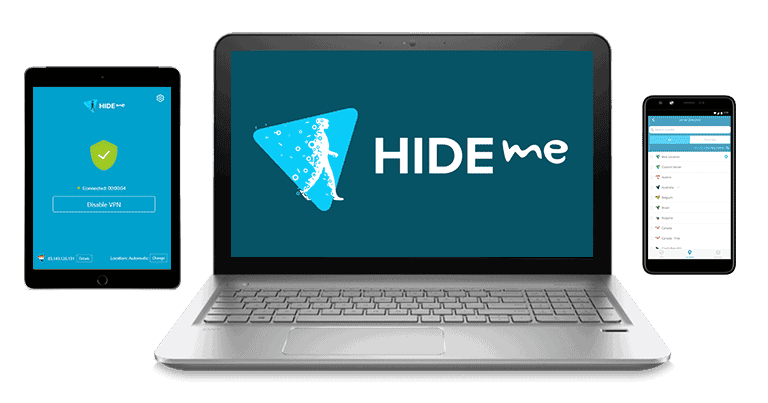
hide.me’s free plan allows unlimited bandwidth and provides access to free servers in 8 countries — including in the US, the UK, the Netherlands, France, and Germany. Thanks to the relatively big number of free server locations, it helps you to connect to a nearby server to get fast speeds. I also like how the free plan works without an account, so you can use it without sharing your email, which is great for privacy.
I ran speed tests on servers in 4 countries, and most websites I accessed usually loaded instantly — what’s more, when I watched HD videos on YouTube, they only took around 2 seconds to fully load and didn’t buffer when I skipped through them. Plus, the free plan includes split-tunneling, which you can use to boost your VPN speeds.

hide.me’s apps are beginner-friendly. The interface is easy to navigate, all the settings feature quick explanations (great for new users), and the ping is displayed for each free server location (to help you find the best speeds). That said, I do need to highlight how the app design looks a bit outdated, especially when compared to Proton VPN’s apps.
I also like how free users get access to 24/7 live chat support — this is extremely convenient, as most free VPNs limit you to just support libraries or email support. The provider’s live chat reps reply really fast and provide helpful answers.

hide.me’s paid version allows 10 connections and adds great streaming support, as it works with popular platforms like Netflix and Amazon Prime. It also adds access to the provider’s entire server network, which numbers 2,300+ servers in 58 countries. And you get access to great P2P support, as well as port forwarding, which lets you increase your torrenting speeds by connecting to more peers.
hide.me has affordable plans that start at $2.39 / month. There’s a 30-day money-back guarantee for all plans.
Bottom Line:
hide.me provides access to free servers in 8 countries. In addition, its free servers limit speeds but maintain pretty fast speeds, which you can also boost via split-tunneling. And, free users get access to 24/7 live chat, too. The paid version adds access to all servers, as well as streaming and P2P support. And the paid plans are backed by a 30-day money-back guarantee.
Read the full hide.me review here
4. Hotspot Shield — Good for Secure Web Browsing
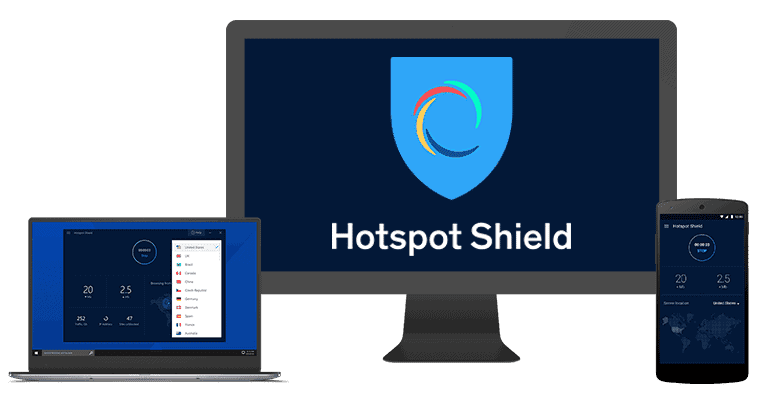
Hotspot Shield’s free plan has unlimited data and is good for surfing the web (as there’s no limit to how many sites you can browse or how many videos you can watch). Plus, you don’t even need to create an account to use it.
The free plan didn’t cause big slowdowns on my end — its proprietary Hydra protocol delivers excellent speeds while still being very secure. In my tests, websites took 2–3 seconds to load, and I was able to watch videos on YouTube in standard definition without any buffering.

However, it collects your IP address to serve you ads if you use the mobile apps. These ads can get frustrating, as you have to watch a 30-second ad every 15 minutes to use the VPN. If this is a deal-breaker, just use the desktop apps instead, as they don’t have this issue. If you just want to use a free VPN on mobile, get Proton VPN or hide.me instead, as their mobile free plans don’t have ads (or log user IPs).
But the free plan only lets you use servers in 3 countries: the US, the UK, and Singapore. While the number is low, users in North America, Europe, and Asia will still be able to use a server that’s close to them to get smooth speeds. I particularly like that there are 2 options in the US (New York and Los Angeles) for both East and West Coast users.

Unfortunately, I wasn’t too impressed with its customer support. The free plan doesn’t give you access to any real-life humans, only an online database of troubleshooting guides. hide.me, on the other hand, provides free users with access to 24/7 live chat support.
I like that it also has a 7-day free trial, which very few VPNs offer. However, you do have to put in your credit card details, so if you don’t cancel within 7 days, you’ll be automatically charged. That said, you could take advantage of the generous 45-day money-back guarantee to get your money back if you forget to cancel before your free week is up.
Hotspot Shield has monthly and yearly subscriptions that start at $6.66 / month — they remove the IP logging, add access to 3,200+ servers in 85 countries, add streaming support, allow 10 connections, and are also backed by a 45-day money-back guarantee.
Bottom Line:
Hotspot Shield’s free plan is great for fast web browsing, as it allows unlimited data and has pretty good speeds. But it limits you to servers in 3 countries and 1 device, and it logs your IP address and displays ads on mobile. The paid version removes IP logging and ads on mobile, adds 10 connections and more servers, provides much better security, is affordable, and comes with a 45-day money-back guarantee.
Read the full Hotspot Shield review here
5. Windscribe — Decent Free VPN for Streaming
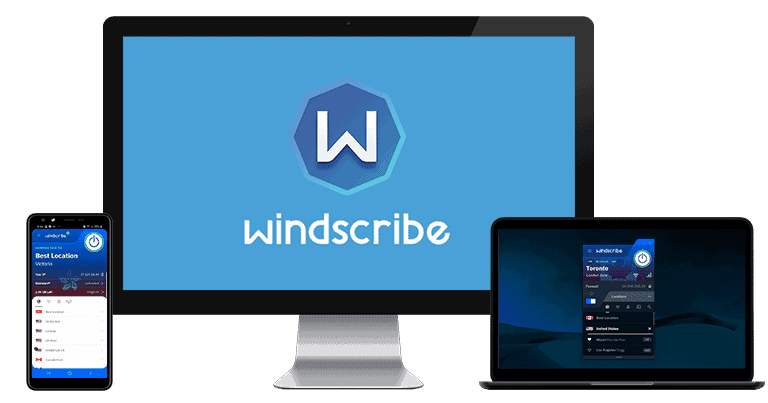
Windscribe has one of the only free plans that has streaming support — it works with top sites like Netflix, Max, Amazon Prime, and BBC iPlayer. Plus, the free plan allows torrenting too. In addition, this is also one of the few free VPNs that allows unlimited connections, so you can use it on as many devices as you want, making it a good pick if everyone in your family needs a free VPN.
However, my biggest complaint about Windscribe is it places a limit of data per month. You automatically get 2 GB per month, but that amount is increased to 10 GB if you provide your email address — this allows the VPN’s marketing department to contact you with offers. While 10 GB of data per month is decent (I got around 50 hours of browsing time and 8 and a half hours of streaming time in my tests), I still prefer Proton VPN’s free plan, as it comes with unlimited data.

Windscribe also has pretty good speeds and allows you to access servers in 10+ countries. It provides access to split-tunneling as well (I was impressed to see that you can split-tunnel both apps and IP addresses), and you get full access to R.O.B.E.R.T, which is and advanced ad blocker that can block ads, malicious sites, adult websites, social media platforms, gambling sites, and more.

Windscribe’s paid version starts at $5.75 / month, and it adds servers in 68 countries and unlimited bandwidth. Unfortunately, there’s only a 3-day money-back guarantee.
Bottom Line:
Windscribe’s free plan works with popular streaming sites, including Max, Netflix, and BBC iPlayer. It also supports torrenting and unlimited connections, but only allows 10 GB per month. In addition, it comes with servers in 10+ countries, has decent speeds, and provides strong security features. The paid version adds servers in more countries and unlimited data, is affordable, and is backed by a 3-day money-back guarantee.
Read the full Windscribe review here
Bonus. TunnelBear — Really Good Free VPN With Access to All Servers & Features
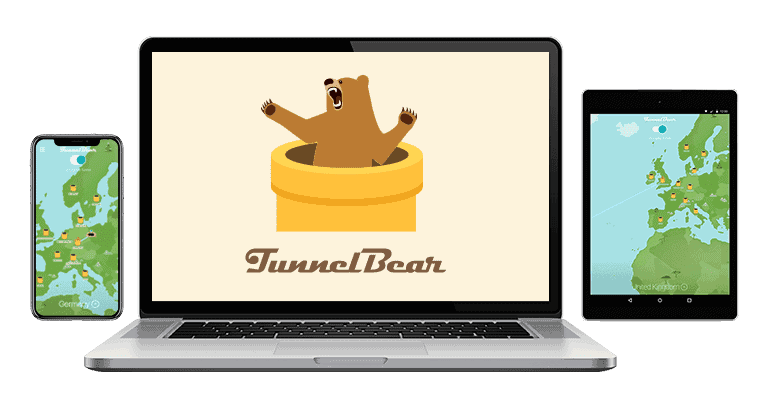
TunnelBear’s free plan includes access to all servers in 47 countries, making it very simple to find the server closest to your real location to get the best speeds. In my tests, TunnelBear had pretty good speeds — sites and HD videos took 3–4 seconds to load, and the videos didn’t buffer when I skipped through them.

It’s also great that TunnelBear gives free subscribers full access to its premium features, including GhostBear, which overcomes VPN blocks in countries that restrict internet access, and SplitBear, TunnelBear’s split-tunneling tool that lets you exclude both apps and websites from the VPN tunnel. Plus, TunnelBear lets all free subscribers install TunnelBear on unlimited devices.
Unfortunately, TunnelBear Free has a monthly data limit of only 2 GB — it’s enough for basic browsing, but that’s about it. Essentially, the free plan is really only good for testing out the VPN (and upgrading to one of TunnelBear’s paid plans if you like it) rather than using it on a daily basis. If you need unlimited bandwidth, try Proton VPN or hide.me instead.

The VPN has a very intuitive dashboard across all apps — all of its features are well-designed and easy to access, and there are cute bear cartoons all over the apps that help you understand and use all of the functions. I really like that all of its apps come with an interactive map, which allows you to click on a country pin to connect to a server that’s located there.
To get unlimited data, you’ll need to upgrade to one of TunnelBear’s premium plans, which start at $3.33 / month. Just keep in mind the provider sadly doesn’t have a money-back guarantee.
Bottom Line:
TunnelBear’s free plan comes with access to all of its features and servers, good speeds, and unlimited connections. All of its apps are great for beginners, too. However, TunnelBear’s free plan only gives you 2 GB per month, which is barely enough to watch a couple of short videos. Upgrading to TunnelBear’s premium plans gives you unlimited data.
Read the full TunnelBear review here
Quick Comparison Table
Editors' Note: ExpressVPN and this site are in the same ownership group.
Testing Methodology: Comparison & Ranking Criteria
I used our proven testing methodology to guarantee I only recommend free VPNs that meet our strict standards. I tested each VPN with numerous real-life scenarios to determine ease of use, security and privacy, speeds, and more. Each VPN on this list surpassed my expectations and offers more value than other options on the market. Here are the testing criteria I used to decide which VPNs to include on my list and where each one is ranked.
- I evaluated what each free VPN offers. Most free VPN plans are very limited — so I looked for free VPN plans that have good data allowances, don’t spam you with a lot of ads, provide access to a decent number of server locations, or come with P2P or streaming support.
- I looked for a VPN with strong security. All of the VPNs on this list come with standard security features like 256-bit AES encryption (one of the strongest encryptions in the world that is also used by banks), a kill switch that disconnects you from the internet if your VPN connection is dropped, and IP leak protection. Plus, most of my top picks have advanced security tools, like RAM-only servers that wipe all data on each reset, and perfect forward secrecy, which provides a different encryption key for each VPN session. I also made sure my data wasn’t leaked and that the kill switch was effective in shutting down my connection.

- I looked for VPNs with excellent privacy. Every VPN on my list follows a strict no-logs policy, which means it doesn’t monitor or log any data about your online activities, such as torrenting. Plus, the majority of these VPNs are headquartered in privacy-friendly countries that don’t have any data-retention laws, so they’re not legally obliged to keep any information.
- I tested the VPN’s speeds on the free plan. All VPNs decrease your internet speeds due to the encryption process. Free VPNs usually have even slower speeds than premium VPNs because they only give you access to a small number of servers, which creates overcrowding and slows down your connection. I tested all server locations available from each free VPN to make sure the VPN provides good speeds on all servers (ExpressVPN is the fastest).
- I checked that the provider has user-friendly apps. Many free VPNs often come with buggy apps that are difficult to use. However, I tested the desktop and mobile apps to make sure they were simple to install and use.

- I made sure the VPN offered affordable pricing and good value. In case you decide to upgrade to a premium plan, I ensured the VPNs offered budget-friendly plans and come with large server networks, great streaming and P2P support, and multiple connections. I also checked to see if there’s a money-back guarantee for all purchases.
Risks & Disadvantages of Using a Free VPN
- Poor security — Most free VPNs are missing essential security features, which basically defeats the purpose of using one. For example, without strong encryption, a third party can track your browsing habits, and without a kill switch, your data could leak onto the internet if your VPN connection fails. The best way to ensure you’re fully protected is to use a reputable VPN like the ones on this list.
- Slow speeds — A lot of free VPNs only allow you to access a small number of servers. This creates overcrowding on the servers, which leads to slower speeds. However, all of the VPNs on this list maintain good speeds.
- Blacklisted servers — The servers that are available on free VPN plans usually don’t refresh their IP addresses often. This means that many of these IP addresses will get blocked or blacklisted, preventing you from accessing certain websites.
- Weak streaming & torrenting support — The majority of free VPNs don’t have streaming support and very few allow you to share P2P traffic on their free servers. And the free VPNs that actually work with streaming sites and torrent clients usually have monthly or daily data limits, so you can only watch and torrent a few movies or TV shows each day or month. If you’re looking to stream or torrent a lot of content, I strongly recommend purchasing a premium VPN.
- Selling your data — There are some free VPNs that log the websites you visit and then sell this information to other websites. These websites then target you with annoying ads. To protect your privacy, make sure you use a quality VPN that has a strict no-logs policy (ExpressVPN’s no-logs policy has been independently audited and confirmed).
- Data caps — A lot of free VPNs usually limit how much data you can use each day or month. So, you can really only use a free VPN for a few hours of web browsing, SD or HD streaming, or downloading small files. Proton VPN and Hotspot Shield are some of the only ones that allow unlimited data.
- Ads — Some free VPNs may display ads or sponsored content within their apps or while you browse the internet, which can be intrusive and annoying. On top of that, the ads may consume bandwidth, which can slow down your connection.
- Limited simultaneous connections — Free VPNs often restrict the number of devices you can connect simultaneously, which can be a significant limitation if you have multiple devices or if several people in your household need to use the VPN at the same time.
- Limited server locations — Free VPNs typically offer a very limited selection of server locations. This can be an issue if the available servers aren’t close to your location, which’ll mean slower speeds.
- Potential malware — There are free VPNs that contain malware, adware, or other security risks that can compromise your device and personal information. But all VPNs on my list are safe options.
- Compatibility issues — Some free VPNs lack apps for certain platforms (like mobile devices). What’s more, many free VPNs have apps that are difficult to use. Luckily, every free VPN I recommend has user-friendly apps for all major platforms, including iOS, Android, Windows, and macOS.
- Poor customer support — Free VPN providers can’t afford to provide the same level of customer support as paid VPN providers. This means you might deal with slow response times, limited availability, and a lack of support resources if you encounter issues with your VPN app.
Free vs. Paid VPNs
The free VPNs featured on this list include strong security features to safeguard your data and privacy. They offer industry-standard protections, including 256-bit AES encryption, a kill switch, and a strict no-logs policy. Additionally, some of these VPNs provide advanced tools like full leak protection, RAM-only servers, perfect forward secrecy, and full-disk encryption for enhanced security.
Most free VPNs lack the features offered by premium VPNs, which means they tend to offer limited server networks, data usage restrictions, and fewer connections. Plus they can throttle your speeds and fail to offer streaming and P2P support.
Here are a few examples — hide.me’s free plan allows torrenting and has good speeds, but it limits you to servers in 5+ countries, 1 connection, and 10 GB per month, while Proton VPN’s free plan allows unlimited data and has strong security and good speeds, but it lacks streaming and P2P support, and it limits you to servers in 5 countries and 1 connection.
In contrast, upgrading to a top paid VPN will provide you with a much better experience — unlimited data, a large server network, multiple connections, very fast speeds, extra features like split-tunneling and an ad blocker, and full support for streaming and torrenting. Plus, most VPNs offer competitive pricing and back each purchase with a 30-day money-back guarantee, so you can test out the product risk-free.
Overall, there are good free VPNs, but they’re still pretty limited — paid VPNs offer a much better value.
How Do Free VPNs Make Money?
- Advertisements. One of the most common methods free VPNs use to make money is by displaying ads to their users, so it’s not uncommon to see banner ads, pop-ups, or sponsored content in some free VPN apps. Advertisers pay the VPN provider based on impressions, clicks, or other ad performance metrics.
- Premium plans. Some VPNs offer free versions of their apps that often come with limited bandwidth, features, and server selection — mostly so you can test the VPN before buying a subscription. These VPN providers have paid users and generate enough revenue to financially support their free (but often limited) VPN product.
- Selling user data. Unfortunately, a lot of free VPNs out there collect and sell user data (such as browsing history or demographic information) to third-party advertisers, data brokers, or other interested parties. This is why I always recommend getting an affordable premium VPN like ExpressVPN. Also, all VPNs on my list come with a no-logs policy so they don’t collect any of your data and don’t have anything to sell.
Who Are Free VPNs Good For?
Free VPNs offer a basic level of online privacy and security without costing you anything. They’re ideal if you consider yourself one of the following types of users:
- Budget-conscious users: If you’re keen on boosting your online privacy but don’t want to spend any money doing it, a quality free VPN is a good choice. They provide basic protection, such as masking your real IP address and encrypting your web traffic.
- Occasional VPN users: If you only use a VPN for sporadic tasks, like when you’re using a public Wi-Fi network, a good free VPN is enough. This way, you can secure your data no matter where you’re connected, including at the airport, cafe, or gym.
- New VPN users: If you’ve never used a VPN, a free VPN is a good way to test one out without any strings attached. However, keep in mind that free VPNs have limitations, such as slower speeds and fewer server locations, many don’t support streaming and torrenting, and most of them have a daily or monthly data limit.
Overall, there are good reasons to use a free VPN but tread carefully. Free VPNs often have constraints, and some could lack key security features or peddle your data to third parties. If you’re considering a free VPN, always do your homework and pick reputable providers.
How to Get a Premium VPN for Free
You can actually test many top VPNs “for free” since many of them offer refunds. For example, ExpressVPN has a 30-day money-back guarantee for all plans. If you’re not satisfied with the VPN within the refund time period, you can get your money back risk-free.
A number of leading VPNs provide free trials that allow you to try out their services. Nonetheless, it’s important to note that these free trials are usually somewhat limited, since they don’t give total access to all features.
Some premium VPNs have completely free plans, but they come with certain limitations. For example, Proton VPN’s free plan offers unlimited bandwidth, but you only get access to servers in 5 countries. TunnelBear, on the other hand, lets you connect to any of its servers, but it caps your bandwidth at 2 GB per month.
How to Optimize Bandwidth Usage With a Free VPN
Since many free VPNs limit data usage, it’s a good idea to learn how to optimize how much data the VPN uses to make the data cap last until it resets. Here are some things you can try:
- Lower video quality when watching videos. For example, if you’re on YouTube, don’t use 720p or 1080p video quality — switch to 480p or 360p instead since it consumes less data.
- Use an ad blocker. This will reduce the amount of data that ads and trackers consume. Windscribe is one of the only free VPNs that comes with an ad blocker. If you don’t plan on using this provider, use the free uBlock Origin extension (it’s excellent for blocking ads and trackers) alongside the free VPN you plan on using.
- Turn off auto-play features. It’s possible to turn off auto-play on most social media and video-sharing platforms. If you disable auto-play, it will stop video content from automatically starting up, preventing unnecessary data usage.
- Use split-tunneling. This helps save data by only routing sensitive activities through the VPN while allowing low-risk activities, like browsing secure sites, to use your regular connection. hide.me includes the split-tunneling feature in the free plan.
Alternatively, you could just get a VPN that has a free plan with unlimited data. I’d personally go with Proton VPN — in addition to unmetered bandwidth, its free version also provides fast speeds, user-friendly apps, and strong privacy features (including an audited no-logs policy).
Free VPNs to Avoid
- Hola VPN. Hola VPN is a P2P VPN, which means it assigns you another user’s IP address and assigns yours to someone else. This is super dangerous as a bad actor can use it for criminal activities. It also keeps users’ logs, doesn’t encrypt your traffic, and has a history of leaking user IP addresses.
- SuperVPN. SuperVPN is a dangerous VPN that logs a lot of your data, including your IP address, operating system, and browser type. It lacks basic security features, and there’s no way to reach its customer support. On top of that, SuperVPN had a data breach that exposed 133 GB worth of data, including users’ IP addresses, email addresses, and geo-locations.
- Phone Guardian. Phone Guardian isn’t necessarily shady, but it doesn’t work like a regular VPN. The only thing that it does as a VPN is it encrypts your data — it doesn’t hide your IP address or location, it doesn’t have security features like a kill switch, and it lacks any other functionalities that you get with a regular VPN.
- AceVPN. AceVPN has some decent features (like DNS leak protection), but it’s not enough for me to recommend it. It lacks a kill switch, which is an essential security feature, has around 20 server locations, and only offers 1 P2P server. The biggest issue I have with it is that it doesn’t have any dedicated apps, so you’ll have to manually configure it on your device, which is super inconvenient.
- TouchVPN. TouchVPN has 5,500+ servers in 80+ countries, which is impressive. What’s not impressive is that it collects your IP address and the sites you’ve visited.
- Hoxx VPN. HoxxVPN collects information about all of your web activities, your device, and your location. On top of that, it says in its terms of use that it “may” keep it even after you close your account.
- Turbo VPN. Turbo VPN says that it doesn’t collect any information about your online activities under its no-logs policy, but it doesn’t say anything about not collecting your IP address.
- tuxlerVPN. tuxlerVPN’s privacy policy says it logs your website activities, browser information, and contact information, and it can share all of this data with third parties for business purposes.
- FinchVPN. FinchVPN’s site is very shady and buggy. It doesn’t say anything about the VPN features, and when I try to click on the Privacy Policy, it redirects me to the home page.
I’ve also found these shady VPN apps in app stores, but they don’t have an official page or any other official information about them:
- VPN – Super Unlimited Proxy.
- 1clickVPN.
- EasyVPN.
- VPN Proxy Master.
- VPN – fast proxy.
- CrossVPN.
- AnonyTun.
- OK VPN.
- VPN Hat (or Hat VPN).
- VPNGO (or GO VPN).
Top Brands That Didn’t Make the Cut:
- PrivadoVPN. The free plan is ad-free, comes with a no-logs policy, has P2P support, and access to servers in 8 countries. But it doesn’t have streaming support, lets you use the VPN on only 1 device, and doesn’t include security features like RAM-only servers, perfect forward secrecy, split-tunneling, and an ad blocker.
- PrivateVPN. PrivateVPN is user-friendly, good for streaming, and very secure. Unfortunately, it doesn’t have a free version (though its paid plans are quite affordable).
- NordVPN. This provider has tons of really good security features, including ad and malware protection, a data breach monitoring tool, and double VPN servers. Also provides good streaming and fast speeds. However, it lacks a free plan — but its premium plans start at only $3.39 / month.
- Surfshark. A good VPN that allows unlimited connections, works with tons of streaming services, has great P2P support, and comes with a large server network. That said, it doesn’t have a free plan — although its paid plans are super affordable and start at only $2.19 / month.
- ZoogVPN. This VPN offers 10 GB monthly bandwidth for free, but its free plan doesn’t support streaming, includes very limited P2P support, and is missing the industry-standard 256-bit AES encryption, as well as advanced security features like RAM-only servers and perfect forward secrecy.
Frequently Asked Questions
What’s the best free VPN?
Proton VPN is my #1 pick for the best 100% completely free VPN in 2025 — it’s one of the only free VPN plans that allows unlimited bandwidth, and it comes with fast speeds, servers in 5 countries, and strong security and privacy features.
While all of the free VPNs on this list are decent, ExpressVPN is the best overall VPN on the market. It’s not free, but it covers each plan with a 30-day money-back guarantee. ExpressVPN is ultra-secure, has the fastest speeds out there for browsing, streaming, torrenting, and gaming, and offers user-friendly apps for all of the major platforms.
Are free VPNs safe?
Most free VPNs aren’t safe — some free VPNs lack industry-standard security features, some store your data and personal information, and some even come bundled with malware. But if you’re only in the market for a free VPN, I recommend the free VPNs on this list — hide.me, Proton VPN, and Windscribe all come with really strong security and privacy features.
Are free VPNs legal?
Yes, free VPNs (and premium VPNs) are perfectly legal in most countries, but there are some exceptions — countries like China, Iran, Indonesia, North Korea, and a few others have banned the use of VPNs. If you’re caught using a VPN in a country that has banned VPNs, you could face a stiff fine or even jail time.
Do free VPNs work with Netflix and other streaming platforms?
Yes, there are some free VPNs that work with streaming services. However, most aren’t very good for Netflix — most of them don’t work with the site at all, and there are some that only sometimes work with the platform.
Windscribe works well with Netflix and other top sites, like Amazon Prime, Max, and Disney+. Even so, Windscribe’s free plan limits you to 10 GB per month, so you can’t use it to binge Netflix titles.
Instead, you’re better off with a paid VPN like ExpressVPN — it works with 100+ streaming services, including Netflix, and doesn’t limit your data.
Is there a 100% free VPN?
Yes, and there are a few pretty good ones, too. For example, Proton VPN’s free plan allows unlimited data, has fast speeds, and is very secure. Also, hide.me’s free plan allows torrenting, provides strong security and privacy, and lets you connect to servers in 5+ countries.
But even great free VPNs have noticeable limitations — Proton VPN’s free plan lacks streaming and P2P support, only lets you use servers in 5 countries, and limits you to 1 device. hide.me’s free plan limits you to 10 GB per month and 1 device, and you don’t get streaming support.
Overall, you get a much better experience if you pick a premium paid VPN, like ExpressVPN — it includes unlimited data, maintains the fastest speeds on the market, works with 100+ streaming services, has servers in 105 countries, and allows P2P traffic on all of them.
Which devices can I install a free VPN on?
Most free VPNs are available on all popular devices. All of the VPNs on this list have easy-to-use apps for Android, iOS, Windows, and macOS. A few of them are also available on Linux and smart TVs.
What is the best free VPN for torrenting?
hide.me is my favorite free VPN for torrenting — it’s one of the only free VPNs that allows torrenting, maintains fast download speeds, and works with all popular torrenting apps like BitTorrent, uTorrent, Vuze, and others.
That said, hide.me’s free plan restricts you to only 10 GB of data per month, so you can only download a handful of small files. Upgrading to one of its paid plans gives you unlimited data, access to 2,300+ servers in 50+ countries, and up to 10 simultaneous connections.
Even so, ExpressVPN is our top pick for torrenting, as it has high-end security features, the fastest speeds in the industry, servers in 100+ countries that all support P2P traffic, and port forwarding (lets you connect to more peers for faster downloads).
What’s the fastest free VPN?
Proton VPN is the fastest free VPN on this list — in my tests, sites loaded in 2–3 seconds, HD videos loaded in up to 3 seconds, and it only took around 7 minutes to download a 2.2 GB file. But ProtonVPN’s free plan has some noticeable limitations — it only lets you connect 1 device, doesn’t have streaming support, and limits you to servers in 5 countries.
So it’s ultimately better to just get an affordable premium VPN, like ExpressVPN — it’s the fastest VPN on the market, and it also comes with unlimited data, 8 connections, support for 100+ streaming apps, and servers in 105 countries.
What’s the best free VPN for gaming?
The best VPN for gaming is ExpressVPN. It maintains the fastest speeds on the market, which means zero lag and very low ping during your online games. It also offers excellent security features, such as anti-DDoS protection, and it’s one of the only VPNs that offers cloud support. Plus, you get a router app and smart DNS that allows you to connect to the VPN on your PlayStation and Xbox.
